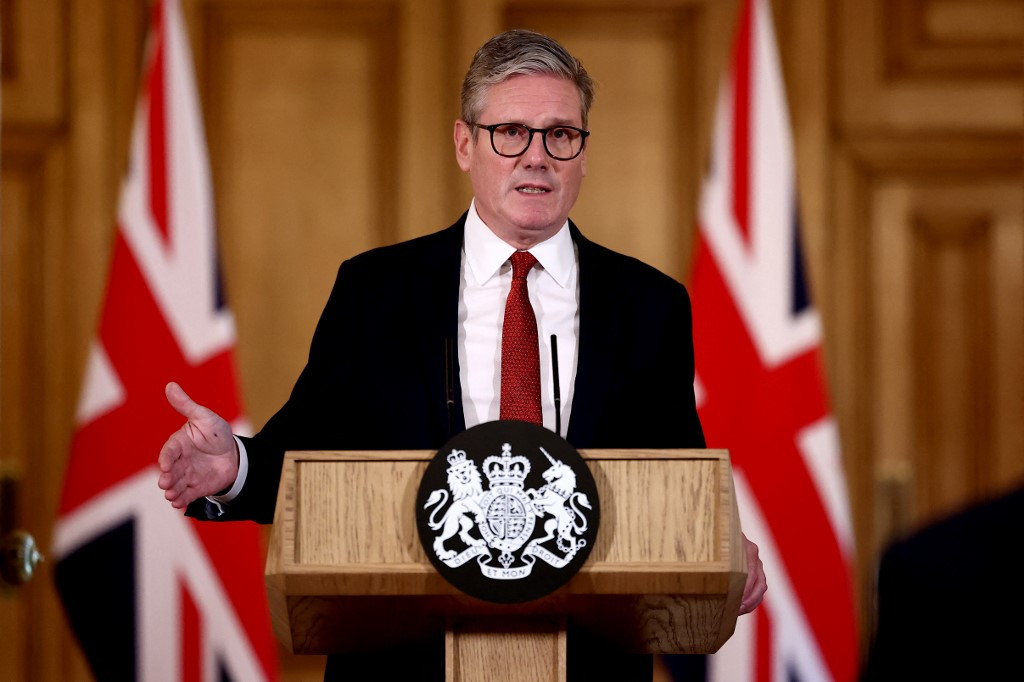Popular Reads
Top Results
Can't find what you're looking for?
View all search resultsPopular Reads
Top Results
Can't find what you're looking for?
View all search resultsTrump tariffs could upend Brexit calculus
If US president-elect Donald Trump means what he says about slapping 10-20 percent tariffs on all goods imported into the US, the UK’s fragile economy could take a big hit.
Change text size
Gift Premium Articles
to Anyone
B
rexit crept back into the headlines last week after Bank of England (BoE) governor Andrew Bailey suggested British policymakers should consider partially mending the United Kingdom’s frayed ties with the European Union.
While the re-integration of the UK with its largest trading partner still seems like a long shot, United States president-elect Donald Trump’s aggressive trade agenda could alter that calculus.
When Bailey became BoE governor in 2020, he made clear his determination to avoid becoming entangled in Brexit, the thorniest of UK political issues. That’s why his recent statements were notable.
In a speech to London’s financial community on Nov. 14, Bailey said the UK “must be alert to and welcome opportunities to rebuild relations” with the EU.
He doubled down in testimony to a parliamentary committee a few days later, stating: “I find it hard to understand people who say we should implement Brexit in the most hostile fashion possible.”
On both occasions, Bailey offered his customary line about not taking a position on Brexit, but his language was more blunt than BoE watchers are accustomed to.
So, does this mean a policy shift could be afoot? It’s a tricky question.
On the one hand, the country’s fiscal policymakers are still suggesting otherwise.
UK Chancellor of the Exchequer Rachel Reeves, speaking at the same City of London event as Bailey, reaffirmed the Labour government’s position that it would not consider rejoining the EU Single Market or Customs Union.
This stance isn’t surprising. Even though Labour won a huge parliamentary majority in July, its 34 percent share of the vote was low. That vulnerability may make the government wary of revisiting Brexit and potentially breathing life into center-right and right-wing opposition groups.
On the other hand, the Labour government might be forced to reconsider the UK’s relationship with the EU, despite the knotty politics, now that Donald Trump is returning to the White House.
If the US president-elect means what he says about slapping 10 percent-20 percent tariffs on all goods imported into the US, the UK’s fragile economy could take a big hit.
The National Institute of Economic and Social Research estimates tariffs of that scale would roughly halve the UK growth rate over the next two years, push inflation 2-3 percentage points higher and necessitate higher interest rates.
Additionally, the EU, the UK’s biggest market, would likely retaliate with tariffs of its own, creating a trade war with potentially devastating consequences.
Britain would thus face a stark choice: seek a bilateral trade deal with the US or align with the large market at its doorstep.
Politics aside, economics seem to favour tilting toward the EU because, even in a globalized 21st century, proximity remains a fundamental driver of trade.
While Britain’s balance of trade with the EU has deteriorated since the Brexit vote, the EU still accounted for around 40 percent of the UK’s exports of goods and services in the first half of 2024 and slightly more than half of its imports.
In comparison, the US represented less than one-quarter of all British exports and under 15 percent of imports.
Still, the UK might be wary of upsetting its “special relationship” with the world’s largest economy.
And the Trump administration might be interested in a bilateral trade deal. Stephen Moore, an economic adviser to Trump, said last week that Britain should reject EU “socialism” in favour of US free enterprise.
“If that were the case, I think it would spur the Trump administration’s willingness to do the free trade agreement,” Moore told the BBC.
But previous negotiations suggest a deal would require the UK to open its markets to US agricultural goods, which have very different standards from those in the UK. The country’s National Health Service might also be forced to allow US pharma giants to charge more for their drugs.
Neither sounds politically popular and both could create further barriers to trade with the EU, causing greater erosion in this trading relationship.
Bailey on Nov. 19 told the House of Commons Treasury Committee, "free trade is not about choosing one area over another".
That may be true, but global trade seems to be increasingly less free by the day. That means the UK will have to make some hard choices, including about its relationship with the EU, because the status quo may no longer be an option.
---
The writer is the former head of communications at the Bank of England and a former senior editor at Reuters.











